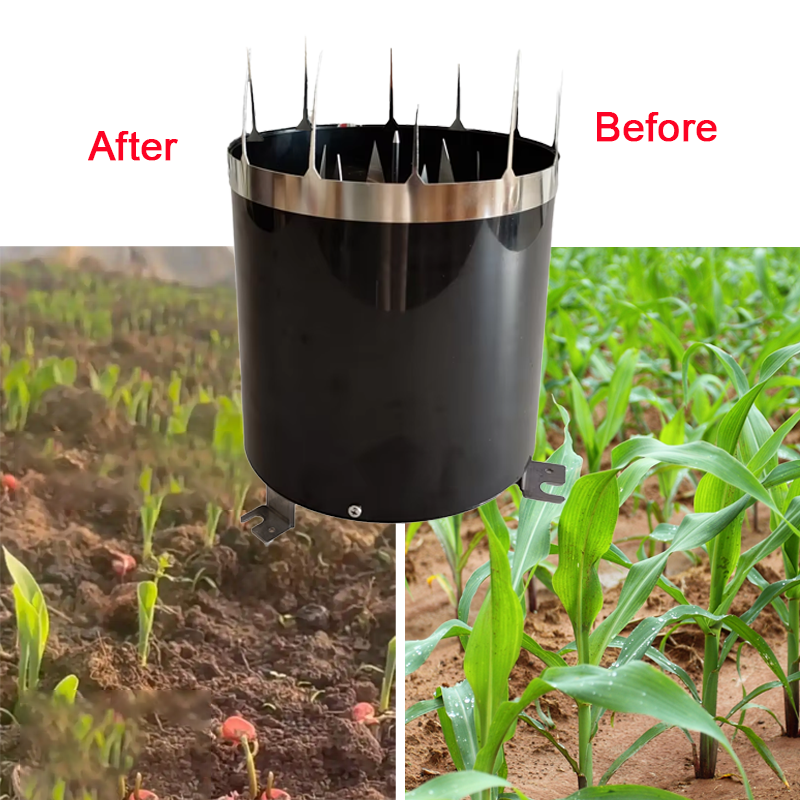تعارف
ہندوستان جیسے ملک میں، جہاں زراعت معیشت اور لاکھوں کی روزی روٹی میں اہم کردار ادا کرتی ہے، پانی کے وسائل کا موثر انتظام ضروری ہے۔ ایک اہم ٹول جو بارش کی درست پیمائش کو آسان بنا سکتا ہے اور زرعی طریقوں کو بہتر بنا سکتا ہے وہ ٹپنگ بالٹی رین گیج ہے۔ یہ آلہ کسانوں اور ماہرین موسمیات کو بارش کے بارے میں درست اعداد و شمار جمع کرنے کی اجازت دیتا ہے، جو آبپاشی کی منصوبہ بندی، فصلوں کے انتظام اور آفات سے نمٹنے کے لیے بہت اہم ہو سکتا ہے۔
ٹپنگ بالٹی رین گیج کا جائزہ
ایک ٹپنگ بالٹی بارش کا گیج ایک چمنی پر مشتمل ہوتا ہے جو بارش کا پانی جمع کرتا ہے اور اسے محور پر نصب ایک چھوٹی بالٹی میں لے جاتا ہے۔ جب بالٹی ایک مخصوص حجم (عام طور پر 0.2 سے 0.5 ملی میٹر) پر بھر جاتی ہے، تو یہ جمع شدہ پانی کو خالی کرکے اور ایک مکینیکل یا الیکٹرانک کاؤنٹر کو متحرک کرتا ہے جو بارش کی مقدار کو ریکارڈ کرتا ہے۔ یہ آٹومیشن بارش کی مسلسل نگرانی کی اجازت دیتا ہے، کسانوں کو ریئل ٹائم ڈیٹا فراہم کرتا ہے۔
درخواست کیس: پنجاب میں بالٹی رین گیج کو ٹپ کرنا
سیاق و سباق
پنجاب کو گندم اور چاول کی وسیع کاشت کی وجہ سے "انڈیا کا غلہ" کہا جاتا ہے۔ تاہم، یہ خطہ موسمیاتی تغیرات کا بھی شکار ہے، جس کی وجہ سے یا تو زیادہ بارشیں ہو سکتی ہیں یا خشک سالی کی صورت حال۔ کسانوں کو آبپاشی، فصلوں کے انتخاب، اور انتظامی طریقوں سے متعلق باخبر فیصلے کرنے کے لیے بارش کے درست اعداد و شمار کی ضرورت ہوتی ہے۔
عمل درآمد
زرعی یونیورسٹیوں اور سرکاری اداروں کے ساتھ مل کر، پنجاب میں ایک پروجیکٹ شروع کیا گیا تھا جس کے ذریعے اہم کاشتکاری کے علاقوں میں ٹِپنگ بالٹی رین گیجز کا نیٹ ورک لگایا گیا تھا۔ اس کا مقصد ایک موبائل ایپلیکیشن کے ذریعے کسانوں کو ریئل ٹائم بارش کا ڈیٹا فراہم کرنا تھا، ڈیٹا پر مبنی زرعی طریقوں کو فروغ دینا۔
پروجیکٹ کی خصوصیات:
- گیجز کا نیٹ ورکمختلف اضلاع میں کل 100 ٹِپنگ بالٹی رین گیجز نصب کیے گئے۔
- موبائل ایپلیکیشن: کسان استعمال میں آسان موبائل ایپ کے ذریعے حالیہ اور تاریخی بارش کے اعداد و شمار، موسم کی پیشن گوئی، اور آبپاشی کی سفارشات تک رسائی حاصل کر سکتے ہیں۔
- ٹریننگ سیشنز: کسانوں کو بارش کے اعداد و شمار اور آبپاشی کے بہترین طریقوں کی اہمیت سے آگاہ کرنے کے لیے ورکشاپس کا انعقاد کیا گیا۔
نتائج
- آبپاشی کا بہتر انتظام: کسانوں نے آبپاشی کے لیے پانی کے استعمال میں 20% کمی کی اطلاع دی کیونکہ وہ بارش کے درست اعداد و شمار کی بنیاد پر اپنے آبپاشی کے نظام الاوقات کو تیار کرنے کے قابل تھے۔
- فصل کی پیداوار میں اضافہ: آبپاشی کے بہتر طریقوں کے ساتھ ریئل ٹائم ڈیٹا کی رہنمائی کے ساتھ، فصل کی پیداوار میں اوسطاً 15% اضافہ ہوا۔
- بہتر فیصلہ سازی۔: کسانوں نے پیشین گوئی شدہ بارش کے نمونوں کی بنیاد پر پودے لگانے اور کٹائی کے بارے میں بروقت فیصلے کرنے کی صلاحیت میں نمایاں بہتری کا تجربہ کیا۔
- کمیونٹی مصروفیت: اس منصوبے نے کسانوں کے درمیان تعاون کے احساس کو فروغ دیا، جس سے وہ بارش کے گیجز کے فراہم کردہ ڈیٹا کی بنیاد پر بصیرت اور تجربات کا اشتراک کر سکیں۔
چیلنجز اور حل
چیلنج: کچھ مثالوں میں، کسانوں کو ٹیکنالوجی تک رسائی میں مشکلات کا سامنا کرنا پڑا یا ڈیجیٹل خواندگی کی کمی تھی۔
حل: اس سے نمٹنے کے لیے، پراجیکٹ میں ہینڈ آن ٹریننگ سیشنز شامل تھے اور معلومات کو پھیلانے اور مدد فراہم کرنے میں مدد کے لیے مقامی "رین گیج ایمبیسیڈرز" قائم کیے گئے تھے۔
نتیجہ
پنجاب میں ٹِپنگ بالٹی رین گیجز کا نفاذ زراعت میں ٹیکنالوجی کو مربوط کرنے کے ایک کامیاب کیس کی نمائندگی کرتا ہے۔ درست اور بروقت بارش کے اعداد و شمار فراہم کرکے، اس منصوبے نے کسانوں کو اپنے پانی کے استعمال کو بہتر بنانے، فصلوں کی پیداوار بڑھانے اور اپنے زرعی طریقوں کے بارے میں باخبر فیصلے کرنے کے قابل بنایا ہے۔ چونکہ آب و ہوا کی تبدیلی روایتی کاشتکاری کے طریقوں کو چیلنج بنا رہی ہے، ہندوستانی زراعت میں لچک اور پائیداری کو بڑھانے کے لیے بالٹی بارش کی پیمائش جیسی اختراعی ٹیکنالوجیز کو اپنانا ضروری ہوگا۔ اس پائلٹ پروجیکٹ سے حاصل ہونے والا تجربہ ہندوستان اور اس سے باہر کے دیگر خطوں کے لیے ایک ماڈل کے طور پر کام کر سکتا ہے، ڈیٹا پر مبنی زراعت اور پانی کے موثر انتظام کو مزید فروغ دے سکتا ہے۔
برائے مہربانی Honde Technology Co., LTD سے رابطہ کریں۔
Email: info@hondetech.com
کمپنی کی ویب سائٹ:www.hondetechco.com
ٹیلی فون: +86-15210548582
پوسٹ ٹائم: جولائی 14-2025


